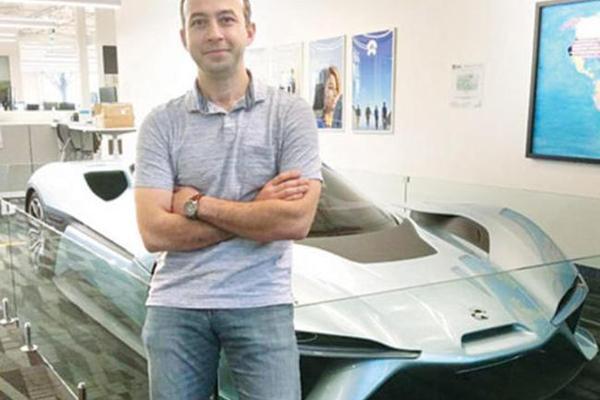Turkish engineer designs speed record-breaking driverless car
Emre Özpeynirci – ISTANBUL


A Turkish engineer has designed a driverless electric car that has broken a speed record in the United States, making him one of the leading individuals in the technology sector.
Assoc. Prof. Kamran Türkoğlu wrote the algorithm for an autonomous car that works with 100 percent electricity and is able to reach 256 kilometers per hour.
“I want to make positive contributions to the advancement of autonomous technology and want to be among the people who shape autonomous [cars] in the world,” Türkoğlu, 35, told daily Hürriyet on Dec. 18, adding that his long-term plan is to set up a startup on artificial intelligence.
“My long-term plan is to complete my mission here and establish a startup on artificial intelligence, which I think will mark the next 40 or 50 years,” he also said.
The NIO EP9 driverless and electric supercar became prominent after it set a couple of lap records at Austin’s Circuit of the Americas in February.
The man behind such a record, Türkoğlu, has been living in the U.S. for the past 10 years and has graduated from the space and aircraft engineering departments at Istanbul Technical University (İTÜ).
He did his master’s degree at İTÜ on unmanned drones and autonomous flight control systems, before doing his PhD at the University of Minnesota on “Control Theory and Dynamic Systems.”
After working for nearly two years at the National Aeronautics and Space Administration (NASA) and developing projects there, Türkoğlu is currently an associate professor at the aircraft-space engineering department at San Jose State University.
The engineer has also been working on the NIO EP9 project with the San Jose (Silicon Valley)-based company NextEV since September 2016 and has been leading the team that developed the algorithm for the autonomous vehicle.
While giving information on the fastest autonomous vehicle he has developed, Türkoğlu also described how the company works and what it focuses on.
“NextEV, which was founded in the U.S. by Chinese investors in 2015 and is based in San Francisco, was in Formula E by developing electric race cars. The company then adopted the name NIO and started to develop electric and autonomous vehicles, while also opening an office in the Silicon Valley and hiring its first employees. I’m the 188th employee. Today, NIO has offices in six regions: San Francisco, San Jose, Munich, London, Shanghai and Beijing,” Türkoğlu said, adding that the office he is working in focuses on driverless vehicles.
“While every office has a different task, the office I’m working in in the Silicon Valley focuses on developing the capability of unmanned driving, its design and implementation and has been carrying out works for that purpose,” he also said.
During his interview, Türkoğlu said his interest in autonomous vehicles started after recent developments in the area.
“I’m especially researching how autonomous vehicles can exhibit performances close to human driving in settings that include many elements and are crowded, such as Istanbul, London, Canberra and San Francisco,” he added.
When asked about his predictions regarding driverless vehicles, Türkoğlu said vehicles around the world are currently evolving in a way that would make them “livable spaces.”
“Smarter and more ergonomic vehicles will focus on making human life easier and give back time lost in traffic. My prediction is that we will start to use driverless vehicles starting from 2019 or 2020. Electric vehicles will be the standard of the sector in the upcoming years. We will be able to see this more distinctly with the developments in battery and storage technologies,” he said.
Saying that automotive perception in Turkey is not open to electric vehicles yet, Türkoğlu noted that the most basic step is forming charging stations and making necessary changes in the infrastructure.
“The vision that fits this needs to be realized at the governance level. While these types of cases are being continued by entrepreneurs, it is not possible to proceed much without state support. The development of this perception will take time,” he added.
In his interview, Türkoğlu was asked whether he would consider returning to Turkey and establish a company or develop a project in the country.
“Honestly, I do not have that idea at the moment,” he said.
